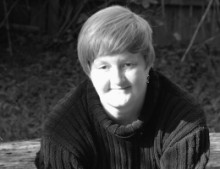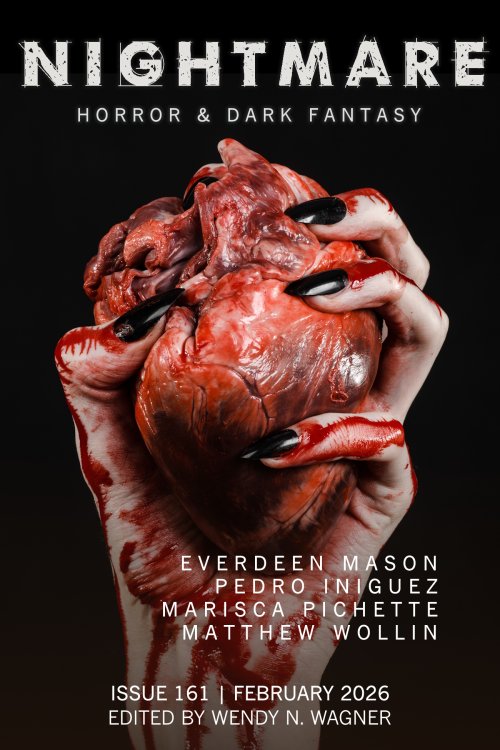“True Crime” is all the more potent for the meta stream of consciousness form, the single paragraph encompassing so many realities and identities, too many for one woman, yet each embraced by a single feminine form. I read it aloud for my second read, savoring the experimental poetry of syllables and images. How did you approach the challenge of creating an entire narrative out of this particular form?
I didn’t think about this one a whole lot. I don’t tend to think about first drafts, in general. I write what I feel compelled to write, and then look at it and decide what to make of it. This one needed only a few minor adjustments. My early writing career was as a poet, however, and I do see the influence of those years of studying poetry and form in this piece.
Tell us something about the inspiration behind “True Crime.”
A couple of months ago, David Barr Kirtley interviewed me on the Geek’s Guide to the Galaxy podcast and we got into a conversation about true crime as a genre. David mentioned that he was conflicted about enjoying such programs. I assured him that there is no reason to feel guilty for watching them. We are not made monstrous for trying to understand the monsters amongst us. Still, there is a voyeuristic aspect to that experience and, after our conversation, that aspect rose within me and asked to be addressed.
Prose is both the scaffolding of a story and the vehicle that carries the narrative forward. The staccato nature of the prose brought to mind spinning under the flashing lights of a dance floor, a sentiment also reflected in the first and last lines of the story. When writing, how much thought do you give to a story’s structure? Are you conscious of the form, or does it flow from the narrative?
The form flows from the narrative and then I consider it. For instance, I really appreciate your keen observation about the staccato nature of the prose in this piece and how it works with the fourth and last lines. My first draft ended in a slightly different place, which didn’t feel whole. After reading it through again, I discovered that reference to dance early in the story and saw how picking it up again at the end might work. Often, if I have moved forward in a piece to arrive at an unsatisfactory destination, I look at where I have been to determine where to go. It meant a lot to me to discover George R.R. Martin’s observation that some writers are gardeners and some are architects, while none are exclusively either. (Brandon Sanderson has an excellent lecture series on YouTube where he covers this subject as well.) I am a gardener in my initial approach, but all following drafts must satisfy the architect. In the MFA program at Vermont College of Fine Arts, I devoted two semesters of my critique work to consideration of form within various novels and, as I said earlier, I began in poetry which is very form-aware.
There are those who insist that writing should not be political, and others who believe that the act of writing and having an opinion is, in itself, a political act. Where do you fall in that spectrum? Do you consider “True Crime” to be a political story?
I stand, passionately, by the power of language as an instrument for action. I think that those writers who feel inclined to write political work should dare to try. Writers should be wary of anyone who says their strength must be deployed only as a tool of entertainment. I do think of this particular story as being political, however.
You’ve skirted the edges of horror and dipped your toes into the waters of dark fantasy. What scares you? What gives M. Rickert the shivers?
Many years ago, when I lived and worked in Sequoia National Park, I worked ten days and had four days off. Sometimes, I could run those four days together so I had eight days off to go hiking. I was on such a trip once when I realized I was being followed by a young couple from Germany on the same trail. We didn’t walk together, but we were in shouting distance of each other. Eventually, a man passed me going in the other direction. What was it about him? I’ll never know. He sent a cold shiver down my spine, and I remember thinking how glad I was that those other two were close behind. His eyes were very dark, and he didn’t point at me like the guy in the Joyce Carol Oates story, but I felt like he had. People scare me most of all.
I had been surprised by, and surprised, bears during my time in Sequoia. Once I almost stepped on a rattler. Another time I thought I was on a trail but it was a ravine, and I came very close to basically walking off the side of the mountain until a bird called overhead, catching my attention. All those moments were frightening.
Your website remarks on the “mysterious gaps” in your biography as where the truly interesting stuff happened. What is one of those bits of interesting stuff?
Oh, I was just trying to be clever. My life is pretty boring. That’s the truth. Mostly.









